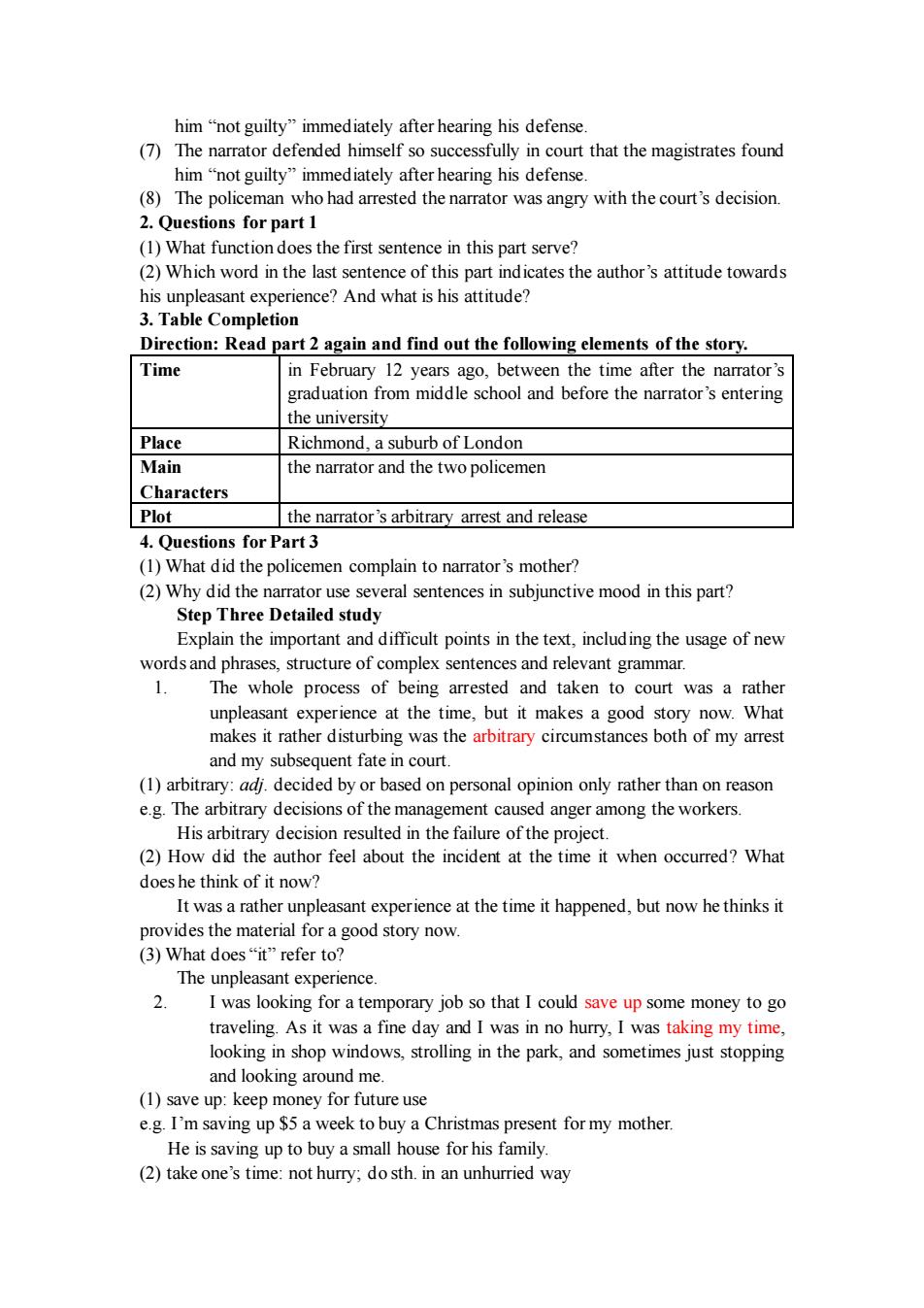正在加载图片...

him"not guilty"immediately after hearing his defense (The arrato defended him successfully in cour that the magistrates found him"not guilty"immediately afterhearing his defense (8)The policeman who had arrested the narrator was angry with the court's decision. 2.Ouestions for part 1 (1)What function does the first sentence in this part serve? (2)Which word in the last sentence of this s pa indicates the author's attitude towards unpleasant experience?And what is his attitude? Direction:Read part 2 again and find out the following elements of the story. Time in February 12 years ago,between the time after the narrator's raduation from middle school and before the narrator's entering the university Place Richmond,a suburb of London Main the narrator and the two policemen Characters Plot the narrator's arbitrary arrest and release 4.Questions for Part 3 (1)What did the policemen complain to narrator's mother? (2)Why did the narrator use several sentences in subjunctive mood in this part? Step Three Detailed study the important and diffcult points in the text,including the usage of new words and phrases structure of complex sentences and relevant grammar The whole process of being arrested and taken to court was a rather unpleasant experience at the time,but it makes a good story now.What makes it rather disturbing was the arbitrary circumstances both of my arrest and my ent fate i (1)arbitrary:decided by or based on personal opinion only rather than on reason e.g.The arbitrary decisions of the management caused anger among the workers. His arbitrary decision resulted in the failure of the project. (2)How did the author feel about the incident at the time it when occurred?What does he think of it now? It was a rather unpleasant experience at the time it happened,but now he thinks it provides the material for a good story now. (3)What does“it”refer to? The unpleasant experience. 2 I was looking for a temporary job so that I could save up some money to go traveling.Asit was a fine day and I was in no hury.I was taking my time looking in shop windows,strolling in the park,and sometimes just stopping and looking around me. (1)save up:keep money for future use e.g i'm saving up $5 a week to buy a christmas present formy mother He is sav mily (2)take one's time:not hurry:do sth.in an unhurried way him “not guilty” immediately after hearing his defense. (7) The narrator defended himself so successfully in court that the magistrates found him “not guilty” immediately after hearing his defense. (8) The policeman who had arrested the narrator was angry with the court’s decision. 2. Questions for part 1 (1) What function does the first sentence in this part serve? (2) Which word in the last sentence of this part indicates the author’s attitude towards his unpleasant experience? And what is his attitude? 3. Table Completion Direction: Read part 2 again and find out the following elements of the story. Time in February 12 years ago, between the time after the narrator’s graduation from middle school and before the narrator’s entering the university Place Richmond, a suburb of London Main Characters the narrator and the two policemen Plot the narrator’s arbitrary arrest and release 4. Questions for Part 3 (1) What did the policemen complain to narrator’s mother? (2) Why did the narrator use several sentences in subjunctive mood in this part? Step Three Detailed study Explain the important and difficult points in the text, including the usage of new words and phrases, structure of complex sentences and relevant grammar. 1. The whole process of being arrested and taken to court was a rather unpleasant experience at the time, but it makes a good story now. What makes it rather disturbing was the arbitrary circumstances both of my arrest and my subsequent fate in court. (1) arbitrary: adj. decided by or based on personal opinion only rather than on reason e.g. The arbitrary decisions of the management caused anger among the workers. His arbitrary decision resulted in the failure of the project. (2) How did the author feel about the incident at the time it when occurred? What does he think of it now? It was a rather unpleasant experience at the time it happened, but now he thinks it provides the material for a good story now. (3) What does “it” refer to? The unpleasant experience. 2. I was looking for a temporary job so that I could save up some money to go traveling. As it was a fine day and I was in no hurry, I was taking my time, looking in shop windows, strolling in the park, and sometimes just stopping and looking around me. (1) save up: keep money for future use e.g. I’m saving up $5 a week to buy a Christmas present for my mother. He is saving up to buy a small house for his family. (2) take one’s time: not hurry; do sth. in an unhurried way